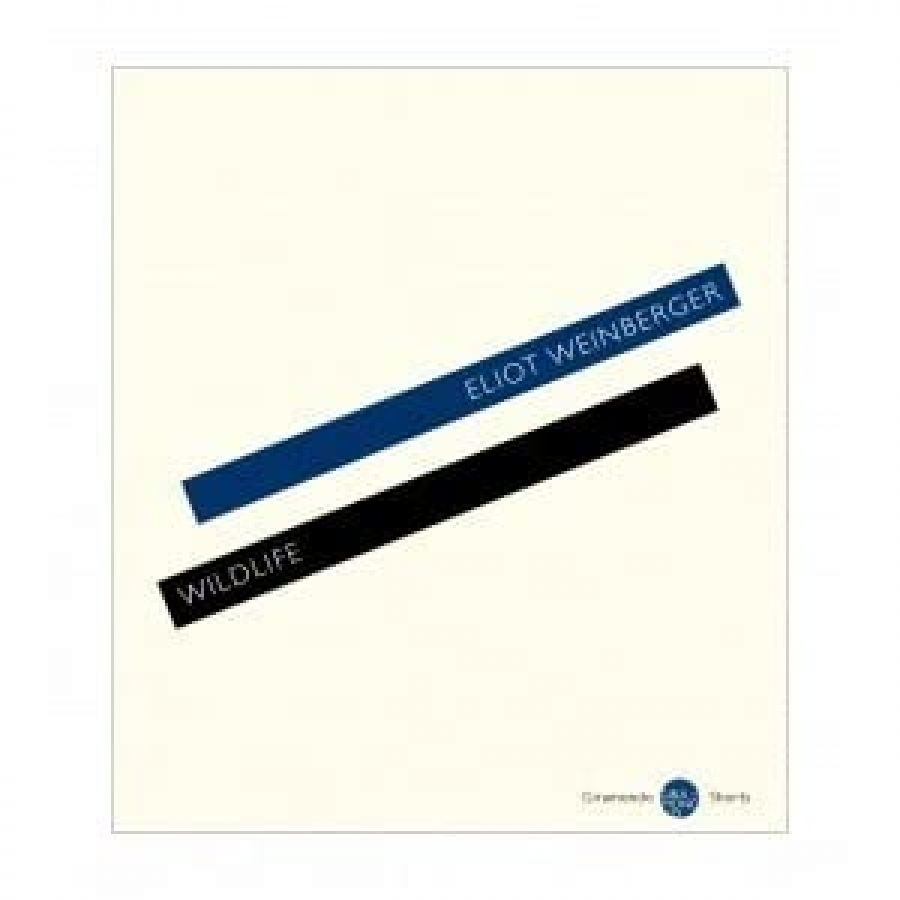
- Free Article: No
- Contents Category: Essay Collection
- Review Article: Yes
- Online Only: No
- Custom Highlight Text:
As is often the case with brilliant writers, an Eliot Weinberger sentence cannot be mistaken for that of anyone else. There is his insistence upon concrete details: ‘It was recorded in the 12th century, in the Collected Stories of Anomalies, that Chang T’ien-hsi dreamed that a green dog with a long body came from the south and tried to bite him.’ Even when entering the realm of the absurd, he avoids abstraction: ‘Each year, in the village of Pullipudupet, in southern India, a very young girl is selected to marry a frog.’ His adjectives and nouns have a rhythmic weight: ‘Camels’ feet leave lotus-pad prints in the sand.’ His conjunctions attest to the peculiarity of the world: ‘Naked mole-rats have no fur, but their lips are hairy.’
- Book 1 Title: Wildlife
- Book 1 Biblio: Giramondo, $24 pb, 120 pp
These examples are taken from Wildlife, a collection of twenty-four essays, which describe, sometimes directly, sometimes obliquely, naked mole-rats, wrens, laughing fish, lizards, crocodiles, tigers, and rhinoceroses, to name just a handful of Weinberger’s creatures. He is interested in foreign places, with a focus on China and India. There is seemingly neither a pattern to what he writes about nor a consistent design to how he does so. His examination of the animal kingdom (and with it the human one) is intellectually both panoramic and idiosyncratic, taking in, without conforming to, the conventions of history, literary criticism, parable, anecdote, poetry, mythology, and travel writing from all over the world. Weinberger gives the impression of having picked the eyes out of the world’s libraries.
The more outlandish the subject of the essay, the wryer the tone: Weinberger challenges the reader to exclaim, ‘but you’re making this up!’ (The Weinberger golden rule: ‘I never make anything up. Faux-erudition was done brilliantly and wonderfully by Borges and Nabokov. There’s no reason to do it again, particularly when the world is strange enough.’) When narrating the bizarre, Weinberger’s face is almost impossibly straight. Only occasionally does unequivocal irony rule, such as in the essay ‘Political Analysts in Medieval India’, in which he states that, according to ‘an encyclopaedia compiled in 1363 by a certain Sharngadhara’, the behaviour of dogs might be interpreted in order to understand the subtleties of the affairs of state:
Generally speaking, things were going quite well in the kingdom if the dog scratched its head with its right forepaw, scratched its left paw with its right paw, scratched its right ear with its right paw, urinated with its right hind leg raised or, if female, scratched its belly.
Humour, for Weinberger, is irony’s devoted accomplice:
In appreciation from its grateful public, the opining dog was ritually bathed at sundown, and given a feast of milk and special cakes made in the shape of dogs: a practice that was refreshingly candid about the dog-eat-dog nature of politics.
Weinberger is drawn towards what he does not already know; his subjects are exotic. In an early essay, ‘Epstein: Exote’, not published here, he makes a case for such a way of writing, declaring that ‘Exoticism is dependent on a kind of ignorance; clearly that which is known and familiar is not exotic. Exoticism brings the shock of non-recognition.’ He is motivated by joy and curiosity, never by the desire to dominate his subjects. The world – anything but under his control – is constantly shimmering and shifting. His essays are a form of mental travel writing, in which all things are new and meaningful. Often ostensibly incongruent images are brought together by sleight of hand. In his words: ‘The world is everything that is not the case.’
Weinberger seems reluctant to decipher or interpret the world, to draw conclusions, to make pronouncements; rather, he wants to examine and describe. Condensed, the prevailing message of the essays (if ‘message’ is the right word) would be ‘Wow’. Unsurprisingly, the forms his essays take, in order to avoid prescription as they do, are as various and original as his subjects. He toys with lists and concrete poetry, writes phonetically, and embeds poetry and fragments of historical documents into his prose. Unlike contemporary essayists such as Geoff Dyer, Weinberger rarely uses the first person. He is an absent narrator of the world, always looking outwards, never navel-gazing.
Wildlife is a book that won’t surprise Weinberger’s readers; in it they will find some old favourites alongside new work. The two mainstays of the book are the long essays ‘Paper Tigers’ and ‘The Rhinoceros’. Even so, most of the essays published here are worth reading and rereading for the realisation of Weinberger’s rare vision for the essay alone (presumably the product of having spent his life in the company of experimental poetry). As he has stated in an interview:
The essay strikes me as unexplored territory in English. With a few exceptions, it is either stuck in the 18th century narrative model – now called the ‘personal essay’ […] I can’t understand this at all, as the essay seems to me to have unlimited potential. It doesn’t need a first person; it can stretch toward pure narrative or the prose poem or the documentary; anything is possible.
Never does that seem truer than when one reads him.


Comments powered by CComment